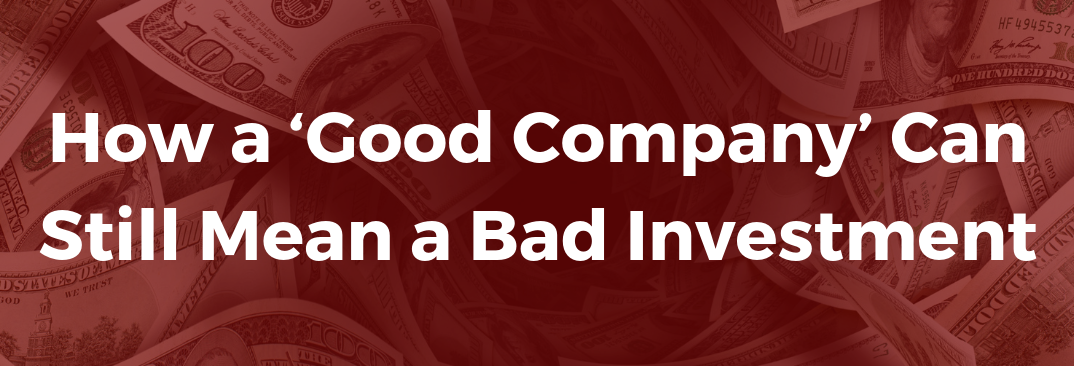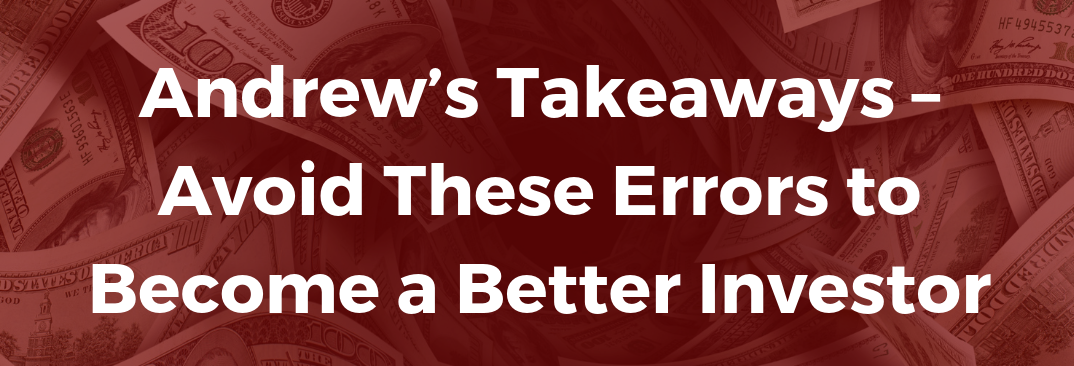How a ‘Good Company’ Can Still Mean a Bad Investment
This post was originally published here.
During my very early days as an equity investor, I invested in a high-quality coal miner that was the market’s darling at the time. It had survived the 2008 financial crisis unscathed and delivered stellar returns in a falling market. I felt this stock was obviously a winner and I had realized big profits.
Ignoring major corrections in the industry
A year later, I revisited the stock after it had fallen from its highs. “This is a good company,” I thought. “It will continue to be a great investment.” I was heavily biased and ignored the research coming out about the revolutionary shale industry.
Pitfall revealed in misguided over-reliance on analyst coverage
Moreover, I was relying heavily on third-party-analyst coverage that was screaming “BUY!”, even as the stock was falling daily. The obvious thing to do? Average down of course! In my mind, this stock was a winner and the share price would surely rebound.
‘Past performance is no guarantee of future results’
However, that was sadly not to be the case. After enduring a 30% loss on a very averaged down position, I had to accept the reality that it would be a tough road ahead for this company, so I took the loss and sold my whole position in the stock. The fact is, the stock did not owe me anything. Just because it did well for me in the past, did not mean the industry or fundamentals could not deteriorate.
Sometimes you must kill the darling of your investments
So, the upsetting lesson for me was that a stock does not know that you own it or what it cost you to buy it. Avoid falling in love with any of the securities you own – they are only tools to help you achieve your investment goals. Try to approach your investments with as much objectivity as you can and recognize the limitations of analysts’ reports and price targets.
Andrew’s takeaways – Avoid these errors to become a better investor
Industry conditions can and do change, and specialists will respond faster than you
One major risk of investing in any individual stock is the risk that something major changes in the industry in which the company is operating. These changes can start small at first and can seem to have little impact, but they can gather steam. Also, professionals who follow an industry for a living, as well as company insiders, will almost always move faster than you.
Financial advisers don’t always put investors’ best interests first
One of the big lessons of my career is that financial professionals are driven by many different factors outside the one that you wish they cared about most – the performance of your investments. I prove this in my Ph.D. research about the lack of accuracy of sell-side financial analysts. You can never eliminate conflicts of interest in the world, and particularly in the financial world, which is why you want to choose financial advice from people who disclose their conflicts of interest. Also, it is often the case that brokers are cheerleaders for stocks rather than thoughtful analysts.
Overconfidence can make an investment’s decline even worse
One of the toughest risks you will face is what to do when a stock price is falling. When you buy a stock at 100 and it goes to 110 you feel great, but when it goes to 90, according to Daniel Kahneman’s and Amos Tversky’s Prospect Theory, you feel about two times worse than you felt great when it went up 10. This will cause you to make mistakes when prices are falling. Often, we are overconfident in our investment decisions, and therefore when the share price starts falling, we think if we liked it at 100 we should like it even more at 90.
However, a clearer way to think of this is that maybe your analysis was correct but that you just bought the stock at the wrong time. Some of my research shows that, over a year, if a stock falls by 20% to 25%, in most markets, you would be better off selling it and holding cash. But, no matter how you might handle this situation, make sure you have thought ahead and written down what you will do when the share price falls.
Even top stocks can take a hit so if fortune’s winds change, take action and let them go
Sometimes we like companies and their management so much, we know them so well, that we think they will always be successful and be a good investment. But things change for companies; industries get tougher, senior management changes. Remember that the success of the past will not guarantee success in the future.
Mistakes in this story
1. Failed to do their own research
- Relied on the assumptions of others
2. Failed to monitor their investment
- Failed to review investment strategy regularly
4. Misplaced trust
- Was overconfident in an idea or their ability
- Assumed past performance would continue
- Got too emotionally attached to an investment
5. Failed to properly assess risk
- Bought more as the price went down
Learn about the six ways you will lose your money and how to avoid them here.
DISCLAIMER: This content is for information purposes only. It is not intended to be investment advice. Readers should not consider statements made by the author(s) as formal recommendations and should consult their financial advisor before making any investment decisions. While the information provided is believed to be accurate, it may include errors or inaccuracies. The author(s) cannot be held liable for any actions taken as a result of reading this article.


